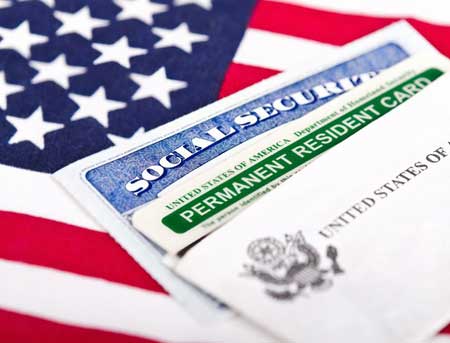 Family based Green Cards are immigrant visas reserved for relatives of US Citizens and Lawful Permanent Residents (Green Card holders). The two steps in applying for lawful permanent residence in the US (a Green Card) are i) not be inadmissible, and ii) establish eligibility within one of the categories by establishing your relationship to a qualifying relative as either a spouse, child, or parent.
Family based Green Cards are immigrant visas reserved for relatives of US Citizens and Lawful Permanent Residents (Green Card holders). The two steps in applying for lawful permanent residence in the US (a Green Card) are i) not be inadmissible, and ii) establish eligibility within one of the categories by establishing your relationship to a qualifying relative as either a spouse, child, or parent.
Foreign nationals who are inadmissible include those with certain criminal history, diseases, and those who are likely to be a public charge. A public charge is someone who is dependent on the government. An affidavit of support from the sponsor, or a joint sponsor can allow a foreign national who otherwise has no financial means, to not be considered a public charge.
There are two main classes of relative petitions; “immediate relatives” and “preference relatives.” The difference between immediate relative petitions and preference relative petitions is that preference relatives must wait until their “priority date ” (see the visa bulletin for more details) is current before they can apply for an entry visa or before they can apply for adjustment of status in cases where they are already lawfully in the United States.
Immediate Relatives are:
- Spouses of US Citizens;
- Children (single, under 21) of US Citizens; and
- Parents of US Citizens (if the US Citizen is 21 and over).
Preference Relatives are:
- First (FB1) – Unmarried sons and daughters (21 and over) of US Citizens;
- Second A (FB2A) – Spouses and unmarried children of Lawful Permanent Residents
- Second B (FB2B) – Unmarried sons and daughters of Lawful Permanent Residents
- Third (FB3) – Married sons and daughters of US Citizens; and
- Fourth (FB4) – Brothers and sisters of US Citizens.
What about Relatives of Family Based Visa Applicants (Derivatives)?
When an individual is sponsored, that person might have spouses and children who they would like to bring with them. The term for such persons is “derivatives.” Only preference relatives may include spouses and children as derivatives. So, for example, if a US Citizen sponsors their parent, that parent can’t bring their children with them. On the other hand, if a US Citizen sponsors their sibling, that sibling can bring their children with them.
What are Specific Eligibility Requirements for a Spouse?
In spousal petitions, the marriage must be legal, which means that all prior marriages must have been legally terminated and the marriage must have been legal in the place of marriage. There obviously can be no fraud, which means that you cannot marry just to get the immigration benefit. And there is a 2-year conditional green card in marriages less than 2 years old at the time the beneficiary gets their green card. The condition must be removed by I-751 , either by the couple jointly, or in the event of divorce it can be done independently with more proof of bona fide marriage, or proof of abuse during the marriage.
What if my US Citizen Spouse Died?
Widows may self-petition for a green card if they were marred for at least 2 years at the time the spouse died, were not legally separated at the time of death, and the petition must be filed within 2 years of the death.
What is the Definition of a Child in Immigration Law?
There are seven classes of children as defined by immigration law, and they are as follows:
- Born in-wedlock child.
- Stepchild – legitimate or not, if the marriage took place before the child is 18 years of age.
- Legitimated child – Legitimization (eg. marriage of the parents after birth) occurring before the child is 18 years of age, and while in custody of the legitimating parent.
- Born out-of-wedlock child – of a natural mother.
- Born out of wedlock child – of natural father only if bona fide parent-child relationship exists while the child was under 21.
- Adopted child – Adoption must be final before the child is 16 years of age, and requires 2 years of legal custody and residence with adoptive parent; adopted child may not later sponsor his/her natural parents.
- Orphan – Must be under 16 years, immediate relative of a US Citizen, who has been abandoned, adopted abroad, or coming to the US only for adoption.
When can I Obtain Family Based Visa?
The most current US Department of State “Visa Bulletin ” will show how long people in preference relatives will have to wait to be able to apply for a green card based on their country of birth. Again, for immediate relatives, there is no priority date issue, which means that green cards are immediately available.
What are the Advantages and Limitations of Immediate and Preference Relative Petitions?
The advantage of the immediate relative petition is obviously the speed in which one may obtain their green card. Also, those who entered the country lawfully, but have fallen out of status may still apply for a green card, but this is not the case for those who are beneficiaries of preference based relative petitions.
While it can take years before the beneficiary of a preference relative petition can finally apply for a green card, the advantage is that preference relatives can bring their derivatives and children with them.
